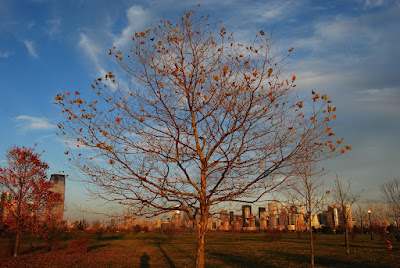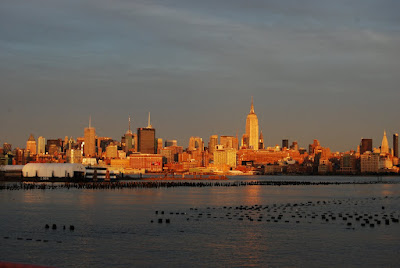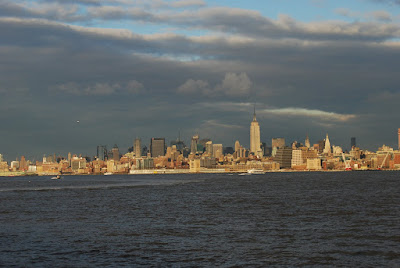To the list of phrases it may be best for political leaders to avoid after a major security incident, add “the system worked” right after “Brownie, you’re doing a heck of a job.”Just as the public did not really share President George W. Bush’s assessment of how things were going after Hurricane Katrina, so too was there a good deal of skepticism when President Obama’s homeland security secretary declared faith in a system that failed to stop a guy who tried to blow up a passenger jet on Christmas Day.
Tuesday, December 29, 2009
The System Worked
Monday, December 28, 2009
Thursday, December 24, 2009
Sunday, December 20, 2009
Winter 2009 in Jersey City



&&&
This part of Jersey City is a neighborhood from a bygone America. This is not so much because of the (undistinguished) architecture. It is because the homes and apartments are close together, the population of the neighborhood is relatively stable, and people in the neighborhood know each other (though sometimes only by sight). The population is predominantly but not entirely Italian-American.
Holy Rosary Roman Catholic Church
344 Sixth Street
From the church's web site:
"During the first few years of the early 1880’s the Italian speaking population of Jersey City began to increase rapidly, but they had no church of their own. In the towns, villages and cities of Italy the local church had been to these people a spiritual and social force. By the end of 1884 Bishop Wigger directed Father De Concilio to organize the Italians of Jersey City into a parish and to build a church. Father James S. Hanly, the pastor of St. Bridget’s was assigned to guide the new parish through its embryonic years.
With the money contributed by the congregation, two lots, 340 and 342 Sixth Street, between Monmouth and Brunswick Streets, were purchased for about two thousand dollars. A small frame structure already on the site was used as a temporary chapel. The first Mass celebrated was in February 1885."
Saturday, December 19, 2009
Wednesday, December 16, 2009
Outdated Heirlooms?
But isn't the point of an heirloom to be outdated? Would an heirloom be an heirloom if it weren't outdated?
I suppose what the jewelry exchange means is that it wants my outdated outdated heirlooms.
Sunday, December 13, 2009
Mayor Healy on Bicycles

Ricardo Kaulessar, "Not just spinning their wheels," Hudson Reporter (Dec. 13, 2009):
Bicycling enthusiast Chris Bray, a Bergen-Lafayette resident for the past five years, recalled at the meeting a conversation with Mayor Jerramiah Healy about making Jersey City more amenable to bicycle riding.
According to Bray, “[Healy] said, and this is a direct quote, ‘You bike around here, are you crazy? I want people to use public transportation.’ ”
Friday, December 11, 2009
Shale Gas & Russia
Saturday, December 5, 2009
Thursday, December 3, 2009
Newspeak in Health Care Reform
Tuesday, December 1, 2009
Canada Recalls the Molotov-Ribbentrop Pact
Canada’s lawmakers have adopted a resolution calling on the government to name Aug. 23 a “Black Ribbon Day” in remembrance of the 1939 Molotov-Ribbentrop Pact. Secret protocols to the treaty carved up Eastern Europe—including Latvia—into territory to be controlled by Nazi Germany and the Soviet Union.
The House of Commons on Nov. 30 gave unanimous consent to the resolution, which among other points noted that knowledge in Canada about the totalitarian regimes and how they terrorized people in Central and Eastern Europe is “still alarmingly superficial and inadequate.”
In memoriam of one of the consequences of the pact: June 14, 1941, a cattlecar, a barge, and death for two people (and many others):
View Larger Map
Wikipedia: "Between 1930 and 1989, more than 500,000 people were banished to Narym and its surroundings."
Saturday, November 28, 2009
Zhu Zhu = žūžū
Zhu Zhu = žu žu
Friday, November 27, 2009
Memories & Horrors & Tyrannies
Ach weh! Human depravity!
The Solzhenitsyn Reader pp. 563-564 (Edward E. Ericson, Jr. & Daniel J. Mahoney, ISI Books, 2006).But the persisting blindness of superiority continues to hold the belief that all of the vast regions of our planet should develop and mature to the level of contemporary Western systems, the best in theory and the most attractive in practice; that all those other worlds are but temporarily prevented (by wicked leaders or by severe crises or by their own barbarity and incomprehension) from pursuing Western pluralistic democracy and adopting the Western way of life. Countries are judged on the merit of their progress in that direction. But in fact such a conception is a fruit of Western incomprehension of the essence of other worlds, a result of mistakenly measuring them all with a Western yardstick. The real picture of our planet's development bears little resemblance to all this.
His Harvard hosts had apparently expected this champion of liberty to be a liberal campaigner against tyranny.
Monday, November 23, 2009
Presidents and Prose
Perhaps this former college president was having a senior moment. I have written my own share of rotten prose.
Saturday, November 21, 2009
Fragments of Liberty Park on a Late November Day




On late November days, Liberty Park (which is adjacent to Ellis Island) has few visitors. These are some of my favorite times in the Park. Between 3:00 and 4:00 p.m. is best. On this day (Nov. 20) the air was cool, the breeze was light, the mid-day sky had been blue, and the late afternoon light was crystalline.
Central Railroad of New Jersey Terminal in Light and Shadow
Sunday, November 15, 2009
Tuesday, November 10, 2009
Saturday, November 7, 2009
A & B
Friday, October 30, 2009
October 31: Reformation Day

Reformation Day, WIKIPEDIA:
Reformation Day is a religious holiday celebrated on October 31 in remembrance of the Reformation, particularly by Lutheran and some Reformed church communities. It is a civic holiday in Slovenia (since the Reformation contributed to its cultural development profoundly, although Slovenians are mainly Roman Catholics) and in the German states of Brandenburg, Mecklenburg-Vorpommern, Saxony, Saxony-Anhalt, and Thuringia. It is also a national holiday in Chile since 2008.
[snip, snip]
In 1516-17, Johann Tetzel, a Dominican friar and papal commissioner for indulgences, was sent to Germany by the Roman Catholic Church to sell indulgences to raise money to rebuild St Peter's Basilica in Rome. Roman Catholic theology stated that faith alone, whether fiduciary or dogmatic, cannot justify man; and that only such faith as is active in charity and good works (fides caritate formata) can justify man. The benefits of good works could be obtained by donating money to the church.
On 31 October, 1517, Martin Luther wrote to Albrecht, Archbishop of Mainz and Magdeburg, protesting the sale of indulgences. He enclosed in his letter a copy of his "Disputation of Martin Luther on the Power and Efficacy of Indulgences," which came to be known as The 95 Theses.
[snip, snip]
Luther objected to a saying attributed to Johann Tetzel that "As soon as the coin in the coffer rings, the soul from purgatory [also attested as 'into heaven'] springs." He insisted that, since forgiveness was God's alone to grant, those who claimed that indulgences absolved buyers from all punishments and granted them salvation were in error. Christians, he said, must not slacken in following Christ on account of such false assurances.
According to Philipp Melanchthon, writing in 1546, Luther "wrote theses on indulgences and posted them on the church of All Saints on 31 October 1517", an event now seen as sparking the Protestant Reformation. Some scholars have questioned Melanchthon's account, since he did not move to Wittenberg until a year later and no contemporaneous evidence exists for Luther's posting of the theses. Others counter that such evidence is unnecessary because it was the custom at Wittenberg university to advertise a disputation by posting theses on the door of All Saints' Church, also known as "Castle Church".
The 95 Theses were quickly translated from Latin into German, printed, and widely copied, making the controversy one of the first in history to be aided by the printing press. Within two weeks, copies of the theses had spread throughout Germany; within two months throughout Europe.
There Is Hope
In a blog-posted video marking a day set aside in 1991 to commemorate victims of Soviet political repression, Medvedev suggested young Russians are getting a lopsided picture of their country's past -- learning plenty about its proud moments but little about the bloodbath that reached its peak under Josef Stalin in the Great Terror of the late 1930s.
''Let's just think about: Millions of people died as a result of terror and false accusations -- millions,'' a somber-faced Medvedev said. ''They were deprived of all rights, even the right to a decent human burial, and for long years their names were simply crossed out of history.
''And yet today it is still possible to hear that these many victims were justified by some higher state goal,'' he said.[snip, snip]
Medvedev said Oct. 30 is a day to remember ''millions of maimed destinies: people shot without trial or investigation, people sent to the camps and into exile, deprived of civil rights.''












































